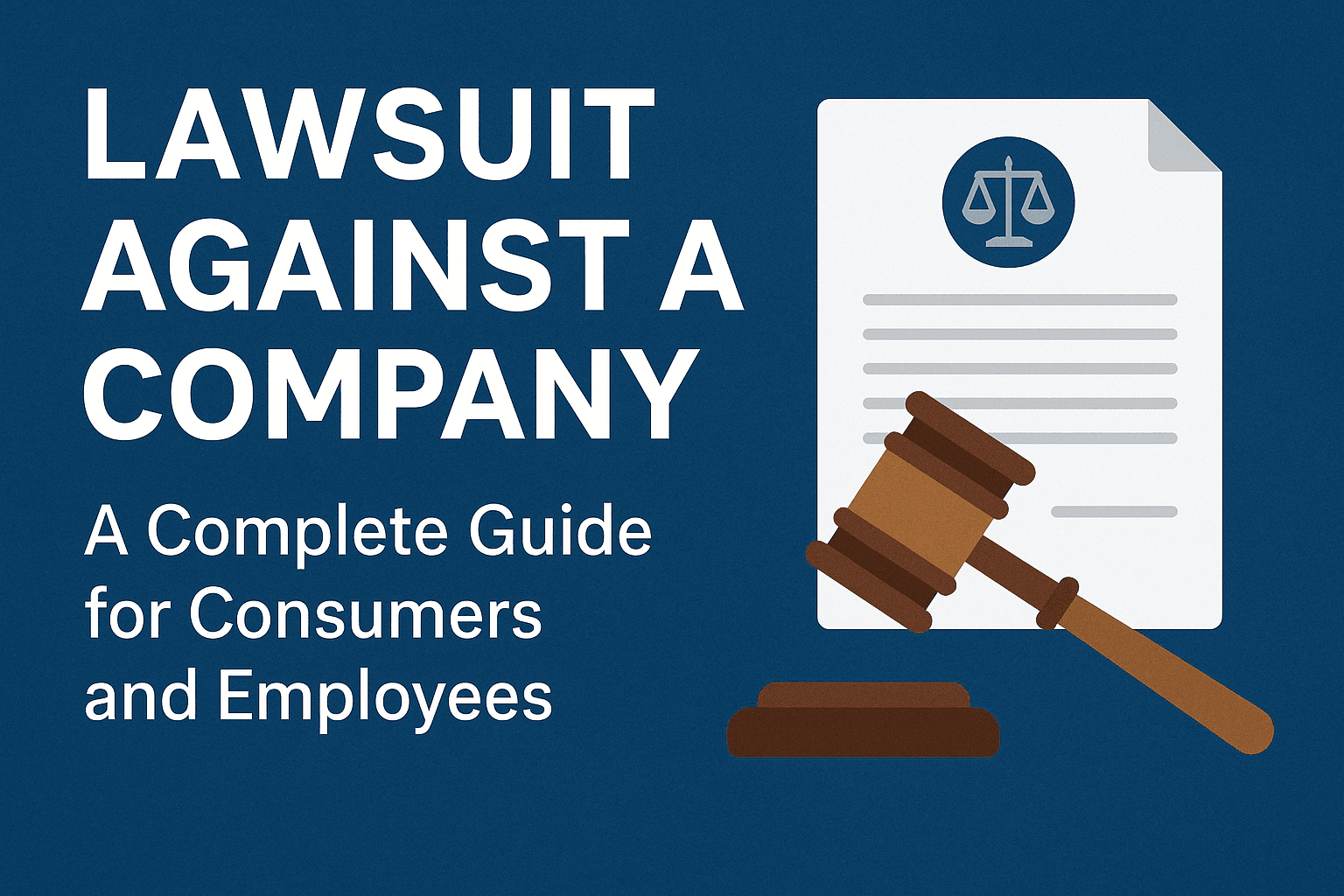
Lawsuit Against a Company: A Complete Guide for Consumers and EmployeesLawsuit Against a Company: A Complete Guide for Consumers and Employees
Taking legal action against a company can seem intimidating, but sometimes it’s the only way to protect your rights. Whether you’re a consumer, employee, or business partner, the law provides avenues to hold corporations accountable for wrongdoing. This article explores the different situations where you can file a lawsuit against a company, the steps involved, and reliable government and educational resources you can use for guidance.
When Can You Sue a Company?
There are several legitimate reasons why individuals may sue a company. These include:
- Breach of Contract – If a company fails to honor its obligations under a contract, you can take legal action. Examples include service providers not delivering agreed services or businesses failing to pay vendors.
- Employment Issues – Employees may sue companies for wrongful termination, wage theft, discrimination, harassment, or unsafe working conditions. The U.S. Equal Employment Opportunity Commission (EEOC) enforces federal laws against workplace discrimination (EEOC.gov
- ).
- Personal Injury or Product Liability – If you are injured by a defective product or unsafe business premises, the company may be liable for damages.
- Fraud or Misrepresentation – Customers may sue if a company engages in deceptive business practices or false advertising. The Federal Trade Commission (FTC) oversees consumer protection (FTC.gov).
- Intellectual Property Infringement – Businesses and individuals may file lawsuits if a company violates copyrights, trademarks, or patents.
Types of Lawsuits Against Companies
Class Action Lawsuits
When many people are harmed by the same company, they can join together in a class action lawsuit. Common examples include cases against pharmaceutical companies, car manufacturers, or financial institutions.
Class actions are beneficial because they allow individuals with smaller claims to pool resources and fight a large corporation. The U.S. Courts website explains class actions in detail (uscourts.gov).
Individual Lawsuits
Sometimes it makes more sense to file an individual claim, especially if the damages are unique or substantial (for example, a severe workplace injury).
Small Claims Lawsuits
For smaller disputes (usually under $10,000, depending on the state), you may file in small claims court without needing an attorney. This is common in consumer disputes, such as refund or contract issues. Many states have resources on their court websites to guide citizens on filing.
Steps to Filing a Lawsuit Against a Company
1. Gather Evidence
Document everything. Evidence is the foundation of your case, and it may include:
- Contracts or written agreements
- Emails and communications
- Receipts or financial records
- Photos or videos of damage or unsafe conditions
- Witness statements
2. Try to Resolve the Issue First
Before filing a lawsuit, it’s wise to attempt resolution through:
- Customer service complaints
- Mediation or arbitration (often required in contracts)
- Filing complaints with government agencies like the FTC or EEOC
3. Determine the Type of Court
The type of case determines where to file:
- Small Claims Court – For lower monetary claims.
- State Court – For most consumer, contract, or injury cases.
- Federal Court – For federal issues, large interstate disputes, or class actions.
4. File a Complaint
You or your attorney will file a complaint (the formal legal document) with the court. The company will be served with notice and given a chance to respond.
5. Go Through Discovery
Both sides exchange evidence and information. This process can be lengthy but is crucial in building your case.
6. Settlement or Trial
Most cases settle before trial. However, if no agreement is reached, the case goes before a judge or jury.
Employment-Related Lawsuits Against Companies
Employees are among the most common plaintiffs in lawsuits against corporations. Some key areas include:
- Discrimination and Harassment – Protected by federal law under Title VII of the Civil Rights Act. You can file complaints directly with the EEOC.
- Wage and Hour Violations – Covered under the Fair Labor Standards Act (FLSA), enforced by the U.S. Department of Labor (dol.gov)
- Unsafe Working Conditions – Employees can report safety violations to the Occupational Safety and Health Administration (OSHA) (osha.gov)
For example, if a company fails to provide safe machinery and an employee is injured, the employee may sue for compensation.
Consumer Lawsuits Against Companies
Consumers often sue companies for:
- Defective products (product liability)
- False advertising
- Breach of warranty
- Privacy violations or data breaches
The Federal Trade Commission (FTC) provides resources for filing consumer complaints and understanding your rights as a buyer. See FTC Consumer Protection
Educational and Legal Resources (.edu and .gov References)
Here are some credible references you can link to for further reading:
- U.S. Courts – Class Action Lawsuits: uscourts.gov
- Equal Employment Opportunity Commission (EEOC): eeoc.gov
- Federal Trade Commission (FTC): ftc.gov
- Department of Labor (DOL): dol.gov
- Occupational Safety and Health Administration (OSHA): osha.gov
- Cornell Law School Legal Information Institute (LII) – Excellent resource for understanding civil procedure and employment laws: law.cornell.edu
Conclusion
Filing a lawsuit against a company is a serious step, but it’s often necessary when corporations fail to act responsibly. Whether you’re an employee facing discrimination, a consumer harmed by a product, or a business partner dealing with a broken contract, the legal system gives you the tools to fight back.
The process involves gathering evidence, filing in the proper court, and often attempting settlement before trial. By using government resources like EEOC.gov, FTC.gov, and OSHA.gov, along with educational guides from institutions like Cornell Law School, you can better understand your rights and options.
Remember: lawsuits are not just about compensation—they also hold companies accountable, making the marketplace fairer and safer for everyone.